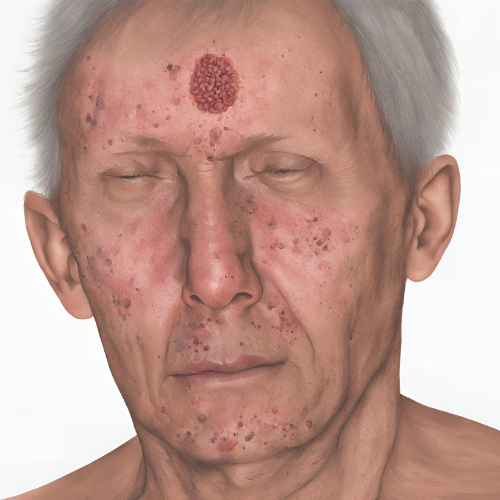Exploring Follicular Lymphoma: Symptoms, Causes, Treatment, and Pharmacokinetics/Pharmacodynamics
What is Follicular Lymphoma? Follicular lymphoma is a type of non-Hodgkin lymphoma, a cancer that originates in the lymphatic system. Specifically, it arises from abnormal B-lymphocytes (a type of white blood cell) and typically presents with enlarged lymph nodes, often in the neck, armpits, or groin. Follicular lymphoma is considered an indolent (slow-growing) form of lymphoma, but it can still cause significant morbidity and require treatment.
Symptoms of Follicular Lymphoma:
- Enlarged lymph nodes, which may or may not be painful.
- Fatigue and weakness.
- Unintentional weight loss.
- Night sweats.
- Fever.
- Abdominal discomfort or fullness (if lymph nodes in the abdomen are affected).
Causes and Risk Factors: The exact cause of follicular lymphoma is unknown. However, several risk factors may increase the likelihood of developing this condition, including:
- Genetic predisposition.
- Immune system disorders.
- Environmental factors (e.g., exposure to certain chemicals or radiation).
- Viral infections (though no specific virus has been definitively linked to follicular lymphoma).
Diagnosis: Diagnosing follicular lymphoma typically involves a combination of physical examination, imaging studies (such as CT or PET scans), and biopsy of an enlarged lymph node or other affected tissue. Blood tests may also be conducted to assess overall health and to evaluate the function of various organs.
Pharmacokinetics and Pharmacodynamics: Pharmacokinetics (PK) and pharmacodynamics (PD) refer to how the body processes a medication (PK) and how the medication exerts its effects on the body (PD). In the context of follicular lymphoma treatment, understanding the PK and PD of medications is crucial for determining dosing regimens, monitoring drug levels, and optimizing therapeutic outcomes.
For example, the PK/PD of chemotherapy agents used in follicular lymphoma treatment, such as rituximab or bendamustine, involves studying how these drugs are absorbed, distributed, metabolized, and eliminated from the body. Additionally, researchers investigate how these medications interact with lymphoma cells and the immune system to induce cell death (apoptosis), inhibit cell proliferation, and modulate immune responses.
Treatment Options: Treatment for follicular lymphoma depends on various factors, including the stage and extent of the disease, overall health, and individual preferences. Common treatment approaches may include:
- Watchful waiting: For patients with low-grade follicular lymphoma and no symptoms, close observation without immediate treatment may be appropriate.
- Chemotherapy: This may involve single-agent or combination chemotherapy regimens, often combined with immunotherapy drugs such as rituximab.
- Immunotherapy: Monoclonal antibodies like rituximab target specific proteins on cancer cells, helping the immune system recognize and destroy them.
- Radioimmunotherapy: This approach combines monoclonal antibodies with radioactive isotopes, delivering targeted radiation directly to cancer cells.
- Stem cell transplant: In some cases, high-dose chemotherapy followed by a stem cell transplant may be considered for eligible patients.
Non-pharmacological Treatment: Non-pharmacological interventions play a supportive role in managing follicular lymphoma and mitigating treatment-related side effects. These may include:
- Supportive care: Addressing symptoms such as pain, fatigue, and nausea through medications, nutritional support, and lifestyle modifications.
- Psychosocial support: Counseling, support groups, and other resources can help patients and their families cope with the emotional and psychological challenges of living with cancer.
- Integrative therapies: Complementary approaches such as acupuncture, massage, and meditation may help alleviate stress and enhance overall well-being.
Conclusion: Follicular lymphoma is a chronic and often manageable form of non-Hodgkin lymphoma characterized by slow-growing tumors in the lymphatic system. While it is not curable, many patients with follicular lymphoma experience long periods of remission and maintain a good quality of life with appropriate treatment and supportive care. Advancements in understanding the molecular mechanisms of lymphoma and the development of targeted therapies continue to improve outcomes for patients with follicular lymphoma. With a multidisciplinary approach that incorporates pharmacological and non-pharmacological interventions, healthcare providers can effectively address the complex needs of individuals living with this condition. Ongoing research efforts aimed at elucidating the underlying biology of follicular lymphoma and identifying novel therapeutic targets offer hope for further advancements in the management and treatment of this disease.




